In the bustling world of automotive engineering, European car factories are renowned for their precision, craftsmanship, and commitment to excellence. To maintain the impeccable performance and longevity of these finely tuned machines, scheduled maintenance is an absolute necessity. In this article, we will delve into the world of European car factory scheduled maintenance, exploring the intricacies of this vital process that keeps your European car running smoothly.

What is Scheduled Maintenance?
Scheduled maintenance, often referred to as routine maintenance, is a proactive approach taken by car owners to ensure that their European vehicles remain in peak condition. It involves a series of regular inspections, adjustments, and replacements as per the manufacturer’s recommendations.
Why is it Crucial?
Regular maintenance is the lifeline of any European car. It ensures safety, reliability, and longevity. Neglecting it can lead to unexpected breakdowns, costly repairs, and even a compromised driving experience.
The heart of your European car deserves meticulous attention. During scheduled maintenance, the engine undergoes a thorough examination. This includes checking for oil leaks, assessing the condition of belts and hoses, and ensuring optimal fluid levels.
The brakes are your first line of defense on the road. Maintenance includes inspecting brake pads, rotors, and brake fluid levels to guarantee responsive and safe braking.
Regular fluid checks and changes are vital. This encompasses oil changes, transmission fluid checks, and coolant level inspections to prevent overheating and engine damage.
Tires are the only point of contact between your car and the road. Scheduled maintenance involves tire rotations, pressure checks, and tread depth assessments to ensure even wear and optimal traction.
A healthy battery is essential for a hassle-free start. Regular maintenance ensures that your battery terminals are clean, and the battery itself is functioning optimally.
European car factory scheduled maintenance is best entrusted to certified technicians with extensive knowledge of these vehicles. They understand the intricacies of each make and model, guaranteeing a precise service.
Following the manufacturer’s recommended maintenance schedule is paramount. It ensures that your European car receives the care it deserves, preserving its warranty and performance.
Extended Lifespan
Routine maintenance helps your European car age gracefully. It keeps components in top shape, potentially extending its lifespan by several years.
Enhanced Resale Value
Well-maintained European cars fetch higher resale values. A documented service history is a testament to the car’s care and can attract discerning buyers.
Improved Fuel Efficiency
Regular maintenance optimizes the car’s performance, leading to improved fuel efficiency. This not only saves you money at the pump but also benefits the environment.
Safety Assurance
Reliable brakes, well-maintained tires, and a finely-tuned engine provide peace of mind while driving, ensuring your safety and that of your passengers.
European car factory scheduled maintenance is the cornerstone of preserving the brilliance and reliability of these automotive marvels. By following the manufacturer’s guidelines and entrusting your car to skilled technicians, you can enjoy a safe, efficient, and enduring driving experience.
Maintenance intervals vary by manufacturer and model. Refer to your owner’s manual for specific guidelines.
While some basic tasks like checking tire pressure can be done at home, it’s advisable to rely on certified technicians for comprehensive scheduled maintenance.
Compared to major repairs resulting from neglect, scheduled maintenance is cost-effective in the long run. It prevents costly breakdowns and extends your car’s life.
While some mechanics can handle European cars, it’s best to choose certified technicians with expertise in your car’s brand.
Skipping maintenance can lead to reduced performance, lower resale value, and potentially costly repairs down the road. It’s not worth the risk.